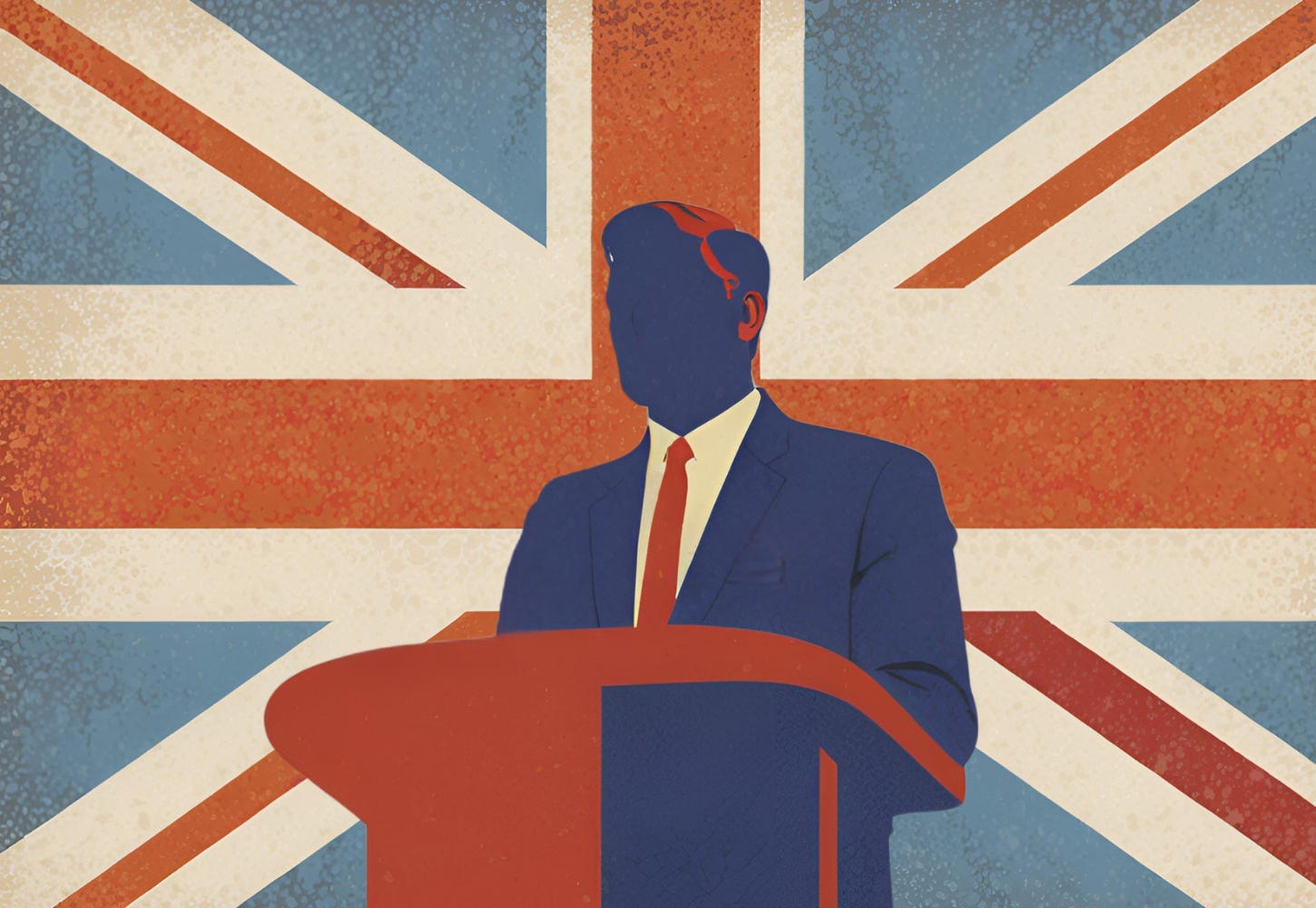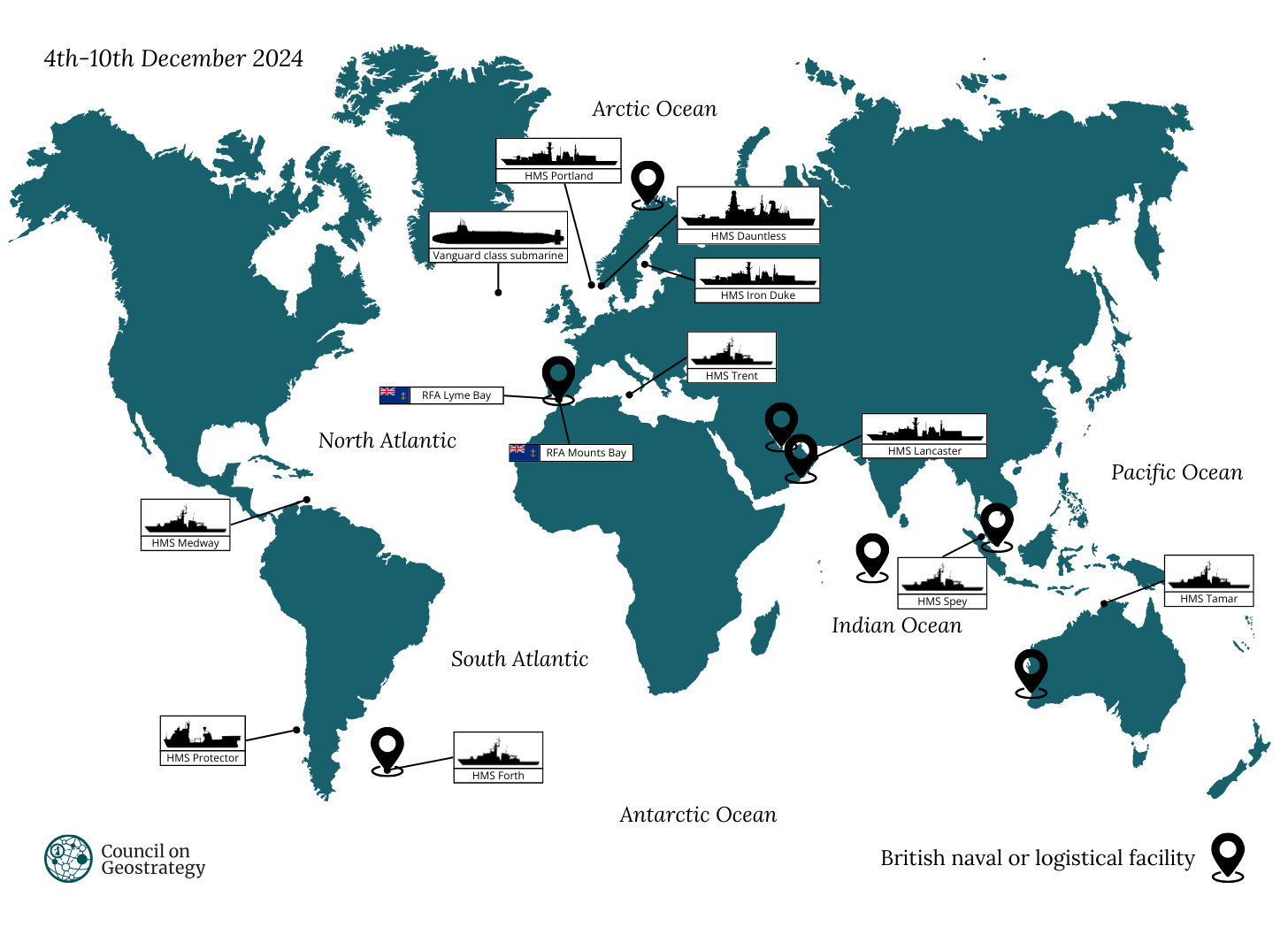Sir Keir Starmer states Britain will become a ‘dependable partner’ again
The Cable | No. 22.2024
Welcome to the 22nd Cable, our weekly roundup of British foreign and defence policy.
What a week it has been, an ill-advised and slapdash coup attempt by an unpopular president in South Korea, the annulment of the recent Romanian presidential elections due to Russian interference, ongoing pro-democracy protests in Georgia and the rapid collapse of Bashar al-Assad’s regime in Syria. The old adage is true: there are indeed decades where nothing happens and weeks in which decades happen. Although it seems as though we have been experiencing many decades in recent months. In this era of mounting chaos and instability, His Majesty’s (HM) Government continues to find its feet in this new geopolitical world.
Welcome back to The Cable.
Starmer highlights ‘securonomics’, dependability and alliances as key to his foreign policy
On 2nd December, Sir Keir Starmer, Prime Minister, attended the Lord Mayor’s Banquet at the Guildhall, at which he delivered a speech laying out his government’s approach to foreign policy. He highlighted that the United Kingdom (UK) finds itself in a worsening geopolitical environment, with war in Europe and the Middle East, resulting in socio-economic pain at home.
The link between security and economic growth appeared throughout his speech, showing the central role ‘securonomics’ plays in the new government’s thinking on foreign policy:
There is no growth without security – and no security without alliances. So to fix the foundations we must meet this more dangerous age with an age of deeper alliances.
The prime minister also called on European allies to increase their defence spending and continue to support Ukraine against Russia’s full-scale invasion, while reaffirming his commitment to spend 2.5% of Gross Domestic Product (GDP) on defence.
Sir Keir’s speech drew from New Labour’s strategic pedigree: a firm commitment to Britain’s allies and his refusal to choose between the United States (US) and Europe: ‘I reject it utterly. Attlee did not choose between allies. Churchill did not choose. The national interest demands that we work with both.’ Expanding further, Sir Keir stated his government will ensure closer ties with the US, maintain its ‘unshakeable commitment’ to the North Atlantic Treaty Organisation (NATO), and renew relations with ‘Europe’ (by which he appears to mean Western Europe given that his predecessors strengthened relations with the northern and eastern flanks of the continent).
Sir Keir concluded his speech by stating that Britain will be ‘...a constant and responsible actor in turbulent times. To be the soundest ally and to be determined – always – in everything we do.’ This begs one simple question: to shape the international order in an increasingly geopolitical age, is dependability needed more than disruptiveness?
Key diplomacy
Sir Keir travelled to the Arabian Gulf on 7th December for talks with the leaders of Saudi Arabia and the United Arab Emirates (UAE). These talks focused on a potential free trade deal with a group of six Gulf nations. Additionally, Sir Keir aims to boost investment into the UK and enhance defence cooperation with Britain’s Gulf partners.
While in the Middle East, Sir Keir released a statement on the fall of the Assad regime in Syria, in which he said ‘The Syrian people have suffered under Assad’s barbaric regime for too long and we welcome his departure.’ The statement goes on to call on all sides to ‘ensure’ a political solution prevails.
Last week, the UK hosted Sheikh Tamim Bin Hamad Al Thani, Emir of Qatar, for a state visit in which the two countries agreed to form closer ties and announced a number of new partnerships. These include:
A £1 billion climate technology partnership focused on energy efficiency, sustainable fuels and renewable energy;
The establishment of an Artificial Intelligence (AI) research commission to enhance collaboration on this emerging technology;
The strengthening of the UK-Qatar defence partnership, to support Middle Eastern security, which includes the extension and expansion of the joint UK-Qatar Typhoon and Hawk fighter aircraft squadrons.
David Lammy, Foreign Secretary, attended the NATO Foreign Ministerial Meeting in Brussels on 4th December. At the meeting Lammy called for NATO allies to increase their defence spending to invest in Euro-Atlantic collective security and also called for increased aid to Ukraine and ensure that Kyiv ‘continues on its irreversible path to NATO membership.’
In response to political unrest in South Korea and Georgia, HM Government issued the following statements:
Catherine West, Minister for the Indo-Pacific, called for ‘a peaceful resolution to the situation, in accordance with the law and the constitution of the Republic of Korea’;
Lammy announced that HM Government will reduce its engagement with the Georgian Government due to the ‘unacceptable’ violence used on protesters. Lammy continued by stating that ‘the UK will continue to stand by the people of Georgia in supporting their right to choose their country’s future.’
Defence
Adm. Sir Tony Radakin, Chief of the Defence Staff, warned in his annual lecture at the Royal United Services Institute that ‘Global power is shifting and a third nuclear age is upon us’. Highlighting the challenge to global stability from the CRINK nations – the People’s Republic of China (PRC), Russia, Iran and North Korea – and the nuclear sabre rattling of Russia, Sir Tony called for significant reform of the British Armed Forces. However, he noted that an invasion of Britain was highly unlikely and the country’s nuclear deterrent ‘has more impact on [Vladimir] Putin than anything else.’
Analysts at the Defence Science and Technology Laboratory (DSTL) have developed a ‘forward presence concept’, for the Royal Navy to ‘improve global presence with fewer warships…slash procurement costs and generate exports for UK industry.’ With the Royal Navy’s current size and strength, this concept should aid in procuring more ships and allow fewer vessels to undertake the work of a larger navy.
On 6th December, the Combined Space Operations Initiative (CSpO) partner nations met in Florence, Italy to discuss the increasing challenges of space security and to reaffirm its members’ commitment to the Outer Space Treaty. CSpO is a ten-nation partnership comprising Australia, Canada, France, Germany, Italy, Japan, New Zealand, Norway, the UK and the US. The initiative – which celebrated its tenth anniversary this year – aims to ‘protect and defend against hostile space activities’.
Environment and climate
On 5th December, Ed Miliband, Secretary of State for Energy Security and Net Zero, gave a speech at the Nuclear Industry Association’s Nuclear 2024 conference, in which he outlined the ‘essential role’ of nuclear energy for Britain’s Net Zero future. Through public and private investment, Miliband stated that HM Government is ‘determined’ to expand Britain’s nuclear industry. For climate commitments and for energy security, ‘nuclear has a particular role in providing clean, stable and reliable power.’ Miliband also confirmed that Great British Nuclear has begun contract negotiations with companies shortlisted in the Small Modular Reactor competition, with a final decision expected in spring 2025.
How Britain is seen overseas
The Lowy Institute in Australia released an article highlighting the declining numbers of Asian students choosing to go to university in Anglophone countries, with students increasingly choosing regional tertiary education institutions instead. The main cause of this is the diminishing number of Chinese students choosing to go to university in Britain, the US and Australia. The article suggests that tightening immigration policy in Anglophone nations, economic hardship and high youth unemployment in the People’s Republic of China (PRC), and geopolitical tensions are the central causes of this transformation.
How competitors frame Britain
Sputnik International released propaganda in which it stated that Britain’s Security Service (MI5) is paring back its focus from counter-terrorism to deal with hostile state actors such as Russia. The article denies Russian foul play in democratic countries and suggests that Britain is engaging in ‘anti-Russian propaganda’ to distract from economic challenges and the ‘looming collapse of the Ukrainian project.’ Decades of Russian espionage, including the murder and attempted murder of Russian citizens on British soil, tell a very different story…
Russia Today released an opinion piece claiming the UK ‘cheers for Al-Qaeda successors’ in Syria, inferring that HM Government supports terrorists. Given that Russia’s brutal support for Assad’s regime in Syria appears to have come to nothing, the Kremlin is attempting to deflect attention from its failures.
Tracking the Royal Navy’s global deployments
4th-10th December 2024: Though out of sight, the Royal Navy’s ballistic missile nuclear submarine continued to deter the most severe threats to British interests from under the North Atlantic. In the Euro-Atlantic, destroyers HMS Dauntless steamed into Stavanger in Norway on 7th December, while HMS Duncan returned to Portsmouth on 8th December after a lengthy deployment to the Mediterranean. Frigates HMS Portland left Haakonsvern in Norway on 9th December, while HMS Iron Duke assisted the Finnish Navy in integrating further into NATO. And at least two of the Royal Navy’s Astute class nuclear powered attack submarines remain deployed; one – possibly HMS Astute – was seen in Gibraltar on 5th December.
On the other side of the world, HMS Protector has left Chile for Antarctic operations after a lengthy period of maintenance, while HMS Lancaster remains in Muscat in Oman. Offshore Patrol vessels HMS Forth remained on patrol around the Falkland Islands, HMS Medway visited Curacao in the Dutch Antilles, where she received the British Ambassador to the Netherlands, HMS Spey left Singapore, and HMS Tamar called into Darwin in Australia. HMS Trent continued to undergo maintenance in Valletta in Malta.
The Royal Fleet Auxiliary (RFA) also continued to support British interests: RFA Lyme Bay remained in Gibraltar, where she was joined by RFA Mounts Bay on 7th December.
How Britain thinks about foreign affairs
One the main themes of the prime minister’s speech at the Guildhall was of British dependability. Since taking office in June 2024, the Labour government has been at pains to signal to the world that Britain, under its watch, will be, once again, a responsible or dependable ally. Previous Conservative governments are depicted in the new discourse as clumsy disruptors.
But the Conservatives’ foreign policy was hardly uniform. Indeed, there has been a fundamental tension in recent years between disrupting the international order and conserving it:
‘Disruptors’ tend to see a world in profound geopolitical flux. They argue that as the world changes, the UK ought not to be afraid of using its power to disrupt and change the status quo – which, in any case, is likely to be changed by others – to its advantage;
‘Managers’ tend to see the world in less adversarial terms. They seek to work through the prevailing international architecture to secure British interests.
Implications
Of course, the two strands of thinking – disrupting and managing – are not necessarily mutually exclusive and can operate simultaneously in different contexts, issue areas, and geographies. They can also come out more strongly across governments of the same political stripe: David Cameron’s administration was more managerial than disruptive, while Boris Johnson’s was more disruptive than managerial.
Which approach was most successful? During Cameron’s years, British foreign policy was rather passive and aloof, while during Johnson’s short tenure, the UK provided dynamic support for Ukraine and established AUKUS.
The fundamental question is how to get the balance right. After all, as John Bew, the foreign policy advisor to three previous prime ministers points out, ‘we are not in a rule-of-law era today. Instead, raw power is being asserted everywhere we look.’ If the Labour government seeks cues from Ernest Bevin – ‘progressive realism’ – it might favour disruption to reconstruct, rather than a passive managerial approach to preserve.
This section is named after Gould Francis Leckie, author of An Historical Survey of the Foreign Affairs of Great Britain (1810) – the first modern geopolitical text.
If you found this Cable useful, please subscribe or pledge your support!
What do you think about this Cable? Why not leave a comment below?






